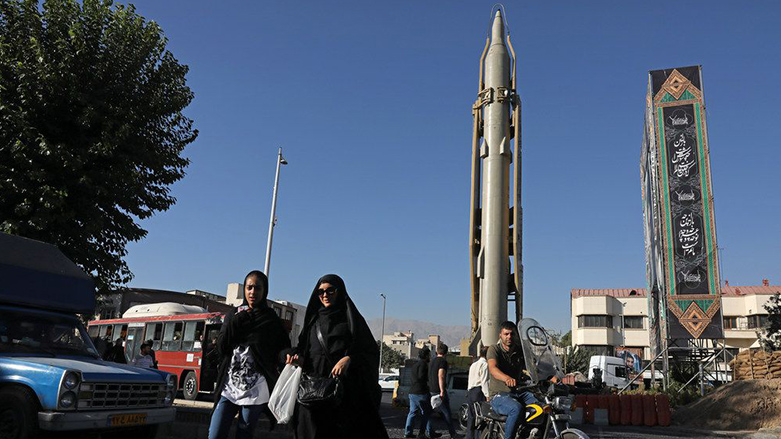US: Iran rejects diplomacy, as French effort comes close, but falters at last minute

WASHINGTON DC (Kurdistan 24) – Brian Hook, US Special Representative for Iran and Senior Policy Advisor to the Secretary of State, Mike Pompeo, spoke to Kurdistan 24 last week on the sidelines of the UN General Assembly.
“Iran has not met our diplomacy with diplomacy,” Hook told Kurdistan 24. “They have been responding with military force,” he continued, “although we have made it clear” for some time “that we would be open to meeting with the Iranians.”
Describing Iran’s recent aggressions, he noted that Tehran had committed “an act of war” in its September 14 attack on Saudi oil facilities.
Asked if Iran might be using Iraq to circumvent US sanctions, Hook replied, “The Iranian regime increasingly views Iraq as a western suburb of Iran.”
The question of Iranian influence in Iraq does, indeed, bedevil US policy. On Monday, Iraq and Syria opened the border crossing between the two countries—at al-Qaim, on the Iraqi side, and al-Bukamal on the Syrian side.
It is the only border crossing to Iraq that is controlled by the Syrian regime. While it will be an economic boon for both countries, it is also “a win” for Iran, Reuters reported, as the border opening “is crucial for Iran’s bid to cement its growing sway over a corridor of territory from Tehran to Beirut.”
Asked about French efforts to broker an understanding between the US and Iran, Hook replied, “I think France did its best to try to increase the odds of a diplomatic outcome for our differences with Iran, but Iran is not interested in diplomacy.”
Yet those efforts, in New York last week, on the sidelines of the General Assembly, appear to have progressed much further than would appear from the public positions of each side.
In fact, the Israelis were quite concerned about such an encounter. As one highly regarded columnist for Ha’aretz wrote in mid-September, “A meeting between the US and Iranian presidents is just about a done deal.
READ MORE: Trump and Rouhani likely to meet at UN: Report
A series of media reports over the past few days, culminating in a story in Politico’s European edition on Tuesday, explained that US President Donald Trump and Iranian President Hasan Rouhani had agreed on a four-point document, negotiated by French President Emmanuel Macron.
Iran committed itself to “never” acquire a nuclear weapon and “fully comply with its nuclear obligations and commitments.” It also agreed to “refrain from any aggression” and “seek genuine peace and respect in the region through negotiations,” Politico reported.
For its part, the US would agree to “lift all the sanctions re-imposed since 2017,” while “Iran will have full ability to export its oil and freely use its revenues.”
In New York, both Trump and Rouhani agreed to the four principles. However, Rouhani also asked that before any meeting, Trump indicate that sanctions would be lifted—which was unacceptable to the US side.
An alternate arrangement was worked out. Trump and Rouhani, each in their respective hotel rooms, would speak by a secure phone line. French technicians installed the communications equipment in Rouhani’s room.
However, when the time came for the call—9:00 PM on Tuesday evening—Rouhani would not speak with Trump. So Macron, who was in Rouhani’s room, spoke with Trump instead.
Macron thanked Trump “for his willingness to negotiate,” Politico reported, but explained that the Iranians were saying that “they need more time to be able to accept the principles of a meeting.”
According to The New Yorker, which first reported the story, Trump had earlier sought to meet with Rouhani: at the UN General Assembly in 2017 and 2018. In addition, in July, Sen. Rand Paul (R, Kentucky) hand-carried an invitation to Iranian Foreign Minister, Mohammad Javad Zarif, to meet with Trump, while Trump also sought to meet with Zarif at the G-7 summit in France the next month.
Since Iran’s 1979 revolution, relations with the US have been like the electrified third rail on a train track. Iranian hard-liners have always maintained a stridently anti-American position—even in the latter part of the 1980s, when the US sold arms to Iran, hoping to reach out to Iranian “moderates.”
Previous US presidents have also sought meetings with Iranian leaders to no avail. In 2000, President Bill Clinton and Mohammad Khatami, then Iran’s president, nearly met at the UN General Assembly, The New York Times reported.
“Aides on both sides had orchestrated a hallway handshake that was meant to look impromptu,” the Times reported, but Khatami balked “at the last minute and hid in a bathroom” until Clinton and his aides moved on.
In 2013, President Barack Obama sought a meeting with Rouhani but had to settle for a phone call: the first—and only—time that the US and Iranian presidents have spoken in four decades.
Yet as Brian Hook told Kurdistan 24, “We are comfortable with our foreign policy. Time is on our side. And at some point, we believe Iran is going to act pragmatically and come to the negotiating table.”
“In the meantime, our sanctions will continue.”
Editing by Nadia Riva
